#include <SM_Output.h>
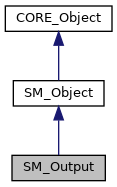
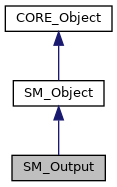
Public Member Functions | |
| SM_Output (void) | |
| create More... | |
| virtual | ~SM_Output (void) |
| destroy More... | |
| virtual tMemSize | getMemorySize () const |
| return the memory size of the class and the memory size of all its attributes/associations More... | |
| virtual tMemSize | getContentsMemorySize () const |
| return the memory size of the included associations More... | |
| void | setSimulations (std::initializer_list< tIndex > &&simulationIndices) |
| set the simulations index to save More... | |
| void | setSimulations (const std::vector< tIndex > &simulationIndices) |
| set the simulations index to save More... | |
| void | setOutputPath (const tString &path) |
| set the output path More... | |
| void | setPrefix (const tString &prefix) |
| set the prefix of generated files More... | |
| tBoolean | generateOutput (SM_Beam &beam) const |
| save the file for animations More... | |
| tBoolean | saveStochasticIndicators (const SM_Beam &beam) const |
| save the stochastic output from beam More... | |
| template<class T > | |
| std::shared_ptr< T > | getSharedPointer () |
| return the shared pointer for this More... | |
| template<class T > | |
| std::shared_ptr< const T > | getConstSharedPointer () const |
| return a const shared pointer for this More... | |
| template<class T > | |
| tBoolean | isInstanceOf () const |
| test if the clas T is an instance of this class More... | |
| tString | getClassName () const |
| return the name of the class More... | |
| tString | getPointerString () const |
| retrun the pointer of the class as a string More... | |
| tString | getIdentityString () const |
| retrun the string identification of the class More... | |
| virtual tString | toString () const |
| return the string representation of the object node More... | |
Static Public Member Functions | |
| static CORE_UniquePointer< SM_Output > | New () |
| build a new instance of the class More... | |
| static tBoolean | SaveMagneticMomentField (const tString &fileName, const tReal &dt, const tInteger &nTimeSteps, const tIndex &nParticles, const tDimension &dim, const tReal *mu_s) |
| save the particles coordinate from field mu at simulation More... | |
| static tBoolean | LoadMagneticMomentField (const tString &fileName, tReal &dt, tInteger &nTimeSteps, SM_RealField &mu_s) |
| save the particles coordinate from field mu at simulation More... | |
| static tBoolean | EnableMemoryStack (const tBoolean &isMemoryChecked) |
| enable the memory stack More... | |
| static void | EnableMemoryStack () |
| enable the memory stack More... | |
| static void | DisableMemoryStack () |
| disable the memory stack More... | |
| static tBoolean | IsMemoryStackEnabled () |
| return trur if the memory stack is enabled More... | |
| static tString | MemoryStackToString () |
| get the memory stack in string More... | |
| static tIndex | GetRegisteredClassesNumber () |
| get the memory stack in string More... | |
Private Member Functions | |
| template<class T > | |
| std::shared_ptr< T > | setThis (std::unique_ptr< T, CORE_Object::Delete > &up) |
| set the shared pointer from an unique pointer More... | |
Private Attributes | |
| std::vector< tIndex > | mSimulations |
| tString | mOutputPath |
| tString | mPrefix |
| std::weak_ptr< CORE_Object > | mThis |
Constructor & Destructor Documentation
◆ SM_Output()
| SM_Output::SM_Output | ( | void | ) |
create
References mOutputPath, mPrefix, and mSimulations.
Referenced by New().

◆ ~SM_Output()
|
virtual |
destroy
Member Function Documentation
◆ DisableMemoryStack()
|
inlinestaticinherited |
disable the memory stack
Referenced by CORE_Object::EnableMemoryStack().

◆ EnableMemoryStack() [1/2]
|
inlinestaticinherited |
enable the memory stack
Referenced by CORE_Object::EnableMemoryStack(), and CORE_Run::SetDebugOptions().

◆ EnableMemoryStack() [2/2]
|
inlinestaticinherited |
enable the memory stack
- Parameters
-
[in] isMemoryChecked : true to verify memory allocation of CORE_Object classes
- Returns
- true if the memroy is checked
References CORE_Object::DisableMemoryStack(), CORE_Object::EnableMemoryStack(), and CORE_Object::IsMemoryStackEnabled().

◆ generateOutput()
save the file for animations
- Parameters
-
[in] beam the beam to print the results
- Returns
- true if the output has been generated
References SM_Beam::getBeamSize(), SM_Network::getDimension(), SM_TimeStepper::getMaximumTimeStepsNumber(), SM_System::getNetwork(), SM_System::getOperatorNames(), SM_Network::getParticlesNumber(), SM_Beam::getSystem(), SM_TimeStepper::getTimeStep(), SM_System::getTimeStepper(), mSimulations, SM_XDMF::New(), tBoolean, tIndex, tNaturalInteger, tReal, and tString.
Referenced by SM_Run::generateOutput(), SM_Test::grid3DParticlesTestCase(), and SM_Test::linedParticlesTestCase().
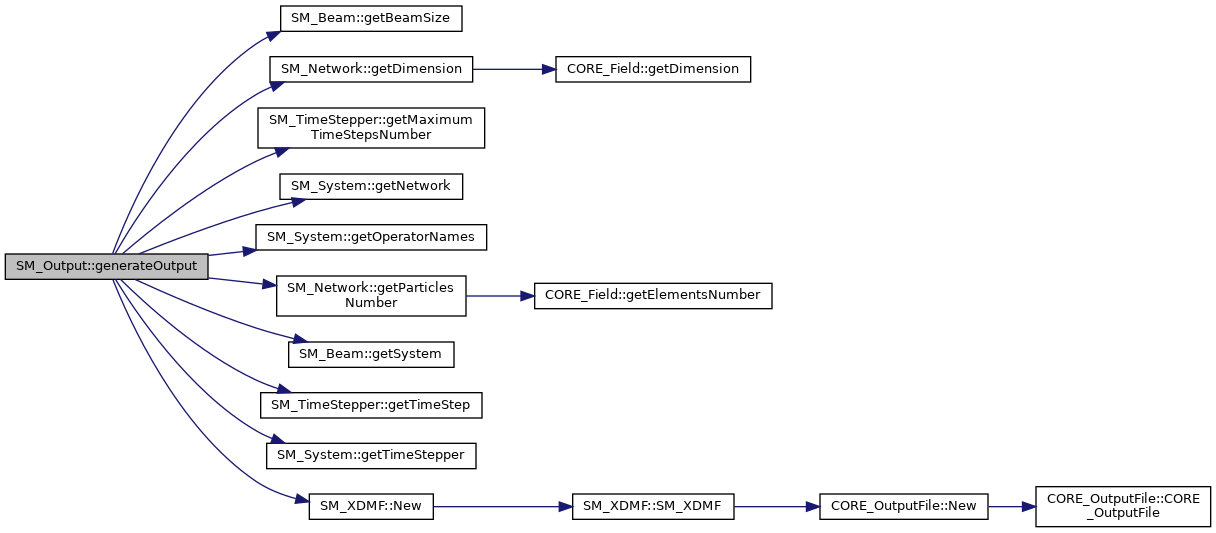

◆ getClassName()
|
inlineinherited |
return the name of the class
- Returns
- the string name of the class
Referenced by CORE_Object::getIdentityString(), and CORE_Test::testTypes().

◆ getConstSharedPointer()
|
inlineinherited |
return a const shared pointer for this
- Returns
- the shared pointer as a type T
References CORE_Object::mThis.
◆ getContentsMemorySize()
|
inlinevirtual |
return the memory size of the included associations
- Returns
- the memory size of the storage in bytes 1 Kb = 1024 bytes 1 Mb = 1024 Kb 1 Gb = 1024 Mb 1 Tb = 1024 Gb 1 Hb = 1024 Tb
Reimplemented from CORE_Object.
References CORE_Object::getContentsMemorySize(), mOutputPath, mPrefix, mSimulations, tIndex, and tMemSize.
Referenced by getMemorySize().


◆ getIdentityString()
|
inlineinherited |
retrun the string identification of the class
- Returns
- the string identity of the class
References CORE_Object::getClassName(), and core_functions::pointerToString().
Referenced by CORE_Test::testArray(), CORE_Test::testField(), CORE_Test::testTypes(), CORE_Object::toString(), CORE_ClassFactory::toString(), and CORE_Field< T, K, D, S, I >::toString().


◆ getMemorySize()
|
inlinevirtual |
return the memory size of the class and the memory size of all its attributes/associations
- Returns
- the memory size of the class and the memory size of its attributes/associations in bytes The mamory size is :
- the added size of the base classes which contains:
- the primary attributes size depends on the order: (first delare the smallest attributes size
- all virtual functions costs <pointer-size> (4 32xor 8 64x) bytes by virtual function
- virtual inherihtance will increase of (4 or 8) bytes
- we add the size of the contains values of the attributes : for example the size of a string is the length of the string 1 octet = 1 byte 1 Ko = 1024 bytes 1 Mo = 1024 Ko 1 Go = 1024 Mo
- the added size of the base classes which contains:
Reimplemented from SM_Object.
References getContentsMemorySize().

◆ getPointerString()
|
inlineinherited |
retrun the pointer of the class as a string
- Returns
- the pointer of the calss as a string
References core_functions::pointerToString().

◆ GetRegisteredClassesNumber()
|
inlinestaticinherited |
get the memory stack in string
- Returns
- the string representation of the memory stack
◆ getSharedPointer()
|
inlineinherited |
return the shared pointer for this
- Returns
- the shared pointer as a type T
References CORE_Object::mThis.
◆ isInstanceOf()
|
inlineinherited |
test if the clas T is an instance of this class
- Returns
- true if the object is an instance of T
Referenced by SM_Beam::templatedSimulate().

◆ IsMemoryStackEnabled()
|
inlinestaticinherited |
return trur if the memory stack is enabled
Referenced by CORE_Object::EnableMemoryStack(), and main().

◆ LoadMagneticMomentField()
|
static |
save the particles coordinate from field mu at simulation
- Parameters
-
[in] fileName name of the simulation [out] dt : time step [out] nTimeSteps : number of time steps [out] mu_s : magnetic moment field at simulation s of size (nTimeSteps+1) x nParticles and dimension dim
- Returns
- true if the loading has succeeded
Load a file of type
comments
nTimesSteps nParticles dim ti P0.0 P0.1..P0.{dim-1} P1.0...... Pi.0 Pi.1...Pi.{dim-1}.... Pp.0 Pp.1...Pp.{dim-1} :
- ti {Pj.d}
- i in [0,nTimeSteps],
- j in [0,nParticles[
- d in [0,dim[
References CORE_Field< T, K, D, S, I >::getSize(), CORE_Field< T, K, D, S, I >::getValues(), core_functions::max(), CORE_Field< T, K, D, S, I >::setElementsNumber(), tIndex, tInt, tReal, and tString.
Referenced by SM_Test::validate().


◆ MemoryStackToString()
|
inlinestaticinherited |
get the memory stack in string
- Returns
- the string representation of the memory stack
Referenced by main().

◆ New()
|
inlinestatic |
build a new instance of the class
- Returns
- an unique pointer of the class
References SM_Output().

◆ SaveMagneticMomentField()
|
static |
save the particles coordinate from field mu at simulation
- Parameters
-
[in] fileName name of the simulation [in] dt : time step [in] nTimeSteps : number of time steps [in] nParticles number of particles [in] dim : dimension of the field [in] mu_s : magnetic moment at simlation s of size (nTimeSteps+1) x nParticles x dim
- Returns
- true if the saving has succeeded
Generates a file of type
comments
nTimesSteps nParticles dim ti P0.0 P0.1..P0.{dim-1} P1.0...... Pi.0 Pi.1...Pi.{dim-1}.... Pp.0 Pp.1...Pp.{dim-1} :
- ti {Pj.d}
- i in [0,nTimeSteps],
- j in [0,nParticles[
- d in [0,dim[
References tBoolean, tIndex, tInteger, and tReal.
Referenced by SM_Test::validate().

◆ saveStochasticIndicators()
save the stochastic output from beam
- Parameters
-
[in] beam the simulated beam
- Returns
- true if the saving has succeeded
References SM_NoiseRateFunction::computeFunction(), SM_Beam::getBeamSize(), SM_Beam::getDeterministicEnergies(), SM_Beam::getEnergies(), SM_TimeStepper::getMaximumTimeStepsNumber(), SM_System::getNoiseRateFunction(), SM_System::getOperatorsNumber(), SM_Beam::getSystem(), SM_TimeStepper::getTimeStep(), SM_System::getTimeStepper(), mOutputPath, mPrefix, tBoolean, tIndex, tNaturalInteger, tReal, and tString.
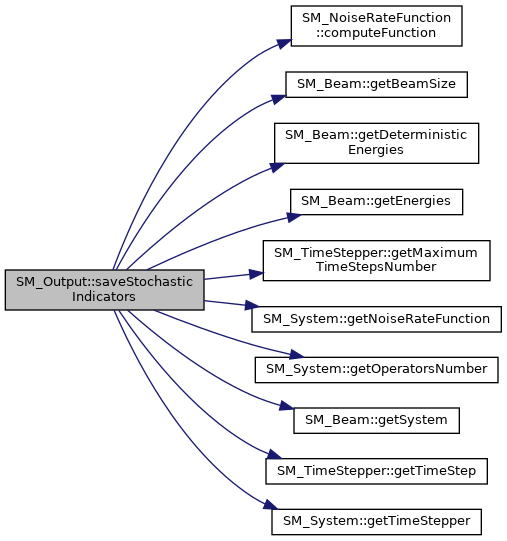
◆ setOutputPath()
|
inline |
set the output path
- Parameters
-
[in] path : output path to generate the files
References mOutputPath.
Referenced by SM_Run::generateOutput(), SM_Test::grid3DParticlesTestCase(), and SM_Test::linedParticlesTestCase().

◆ setPrefix()
|
inline |
set the prefix of generated files
- Parameters
-
[in] prefix : prefix of the generated files
References mPrefix.
Referenced by SM_Run::generateOutput(), SM_Test::grid3DParticlesTestCase(), and SM_Test::linedParticlesTestCase().

◆ setSimulations() [1/2]
|
inline |
set the simulations index to save
- Parameters
-
[in] simulationIndices : simulation index to save
References mSimulations.
◆ setSimulations() [2/2]
|
inline |
set the simulations index to save
- Parameters
-
[in] simulationIndices : simulation index to save
References mSimulations.
Referenced by SM_Run::generateOutput(), SM_Test::grid3DParticlesTestCase(), and SM_Test::linedParticlesTestCase().

◆ setThis()
|
inlineprivateinherited |
set the shared pointer from an unique pointer
- Parameters
-
[in,out] up unique pointer of the class at input, points to null pointer at output
- Returns
- the shared pointer of the class
Method only calledby the friend class CORE_ClassFactory::NewSharedInstance()
References CORE_Object::mThis.
◆ toString()
|
inlinevirtualinherited |
return the string representation of the object node
- Returns
- the string representation of the object node
Reimplemented in SM_TimeStepper, SM_System, SM_StochasticFunction, SM_Network, SM_LandauLifschitzFunction, SM_Beam, CORE_Field< T, K, D, S, I >, CORE_Field< T, K, D, CORE_StdPtrArray< T >, CORE_StdPtrField< T, K, D > >, CORE_Field< T, K, D, CORE_StdValArray< T >, CORE_StdValField< T, K, D > >, CORE_Collection< T, I >, CORE_ClassFactory, and SM_NoiseRateFunction.
References CORE_Object::getIdentityString().
Referenced by SM_Run::run(), CORE_Collection< T, I >::toString(), SM_Beam::toString(), SM_Network::toString(), SM_StochasticFunction::toString(), SM_System::toString(), and SM_TimeStepper::toString().

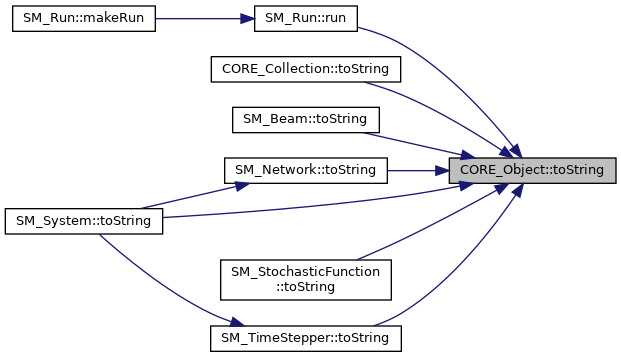
Member Data Documentation
◆ mOutputPath
|
private |
Referenced by getContentsMemorySize(), saveStochasticIndicators(), setOutputPath(), and SM_Output().
◆ mPrefix
|
private |
Referenced by getContentsMemorySize(), saveStochasticIndicators(), setPrefix(), and SM_Output().
◆ mSimulations
|
private |
Referenced by generateOutput(), getContentsMemorySize(), setSimulations(), and SM_Output().
◆ mThis
|
privateinherited |
Referenced by CORE_Object::getConstSharedPointer(), CORE_Object::getSharedPointer(), and CORE_Object::setThis().
The documentation for this class was generated from the following files: